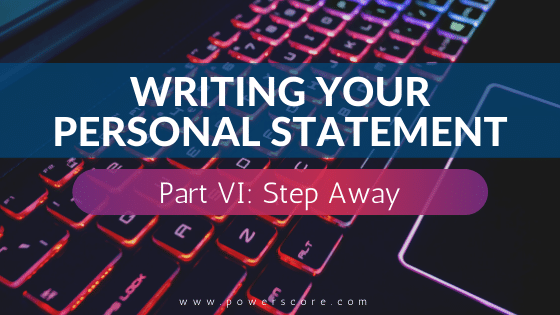Although all components of a law school application are important, the most important one is the personal statement. To that end, this series explains some of the pivotal points you should keep in mind as you prepare to write your law school application personal statement. This is a 10-part series that will help get you from starting to finishing your personal statement.
Step Away
The most important part of writing a personal statement is, funnily enough, sitting down and actually writing it. However, the second most important part is not writing. Yup, you heard right: As important as writing your personal statement is, the one thing you can do to make your writing stronger is taking a step back once you have completed a draft, and giving your writing (and your brain) some time to settle down. Why is that?
Distance is Good
By giving yourself at least a day between writing and revisions, you are letting your brain reset itself. This will let you see grammatical and orthographical errors much more clearly, and will also let you pick up on lapses in continuity and flow within your story. In other words, when you let your brain relax after writing, it’s much more likely to help you out when revising.
It Forces You to Start Early
A typical personal statement can go through as many as five or six drafts and revisions, sometimes even more. Sure, you could try to bang ’em out one after the other, but chances are pretty good you would miss things like misspellings, misused punctuation, and odd transitions. Knowing that you have to account for at least a week of “no writing” days that you’ll sprinkle between drafts will make you start your personal statement more than just a few days before applications are due, which will in turn let you take your time and really craft a solid personal statement.
You can read more about the importance of taking your time and stating early here.
You Have a Chance to Calm Down Emotionally
Many students tackle some pretty intense topics in their personal statement, past struggles and hardships, overwhelming challenges, deep-rooted fears, long-held dreams and aspirations. These topics can get emotionally charged very quickly. Forcing yourself to step back between drafts can help you defuse these heightened feelings and see past them to the meat of the essay and how you’re presenting your case. Although it may seem that you are approaching it in a colder, more calculated manner after a brief break, the opposite is true. You’re actually letting yourself see your prose for what it is, rather than let your emotions dictate what you should write which can sometimes end up sounding unclear or confusing.
Read More in This Series
- Take Your Time
- Plan It Out
- Get Personal
- Get Specific
- Embrace Variety
- Step Away (You Are Here)
- Edit
- Involve Others
- Proof
- Don’t Be Afraid
Subscribe to the blog to get notifications when we post new content!


Leave a Reply